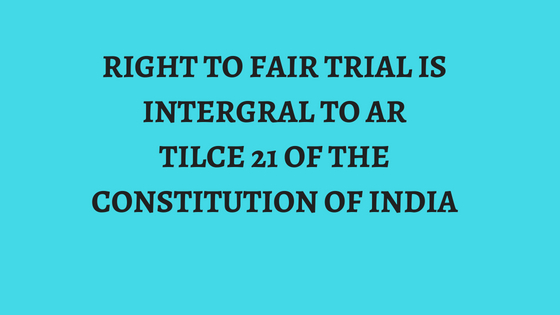Aapka Consultant Judgment Series- In this series, we are providing case analysis of Landmark Judgments of Hon’ble Supreme Court of India.
Mohammed Ajmal Mohammad Amir Kasab @ Abu Mujahid v. State of Maharashtra
(2012) 9 SCC 1
JUDGES: Aftab Alam and Chandramauli Kr. Prasad
Date of Decision: 29-08-2012
FACTS:-
The appellant, who is a Pakistani National, has earned for himself five death penalties and an equal number of life terms in prison for committing multiple crimes in the country. Some major charges were conspiracy, abetting and collecting arms with the intention of waging war against Government of India; commission of terrorist acts; criminal conspiracy, abetment and common intention to commit murder of numerous persons; attempt to murder with common intention; abduction for murder; robbery/dacoity with an attempt to cause death or grievous hurt; and causing explosions punishable under the Explosive Substance Act, 1908. The Trial Court and the High Court convicted him and sentenced him to death. An appeal lies before the Supreme Court.
ISSUE:-
Whether the appellant has been provided fair trial and free legal aid which is integral to Article 21 of the Constitution of India?
JUDGMENT:-
The Hon’ble Supreme Court has observed that the right to fair trial is an integral part of the right to life and personal liberty enshrined under Article 21 of the Constitution of India and that fundamental right is inalienable and there can be no question of any waiver of the right by any person.
The Hon’ble Court, while dealing with the rights of the accused of free legal services, referred the case of Hussainara Khatoon v. Home Secretary, State of Bihar [(1980) 1 SCC 98] and stated that the right to have free legal services of a person accused of an offence is clearly an essential ingredient of reasonable, fair and just procedure which is held implicit in the guarantee of Article 21. This is the constitutional right of every accused person who is unable to engage a lawyer or secure legal services due to poverty, indigence or incommunicado situation and the State is under a mandate to provide a lawyer to an accused person if the circumstances of the case and the needs of justice so require, provided the accused person does not object to the provision of such lawyer.
This constitutional obligation to provide free legal services to an indigent accused person does not arise only when the trial commences but when the accused is for the first time produced before the magistrate. It is elementary that the jeopardy to his personal liberty arises as soon as a person is arrested and produced before a magistrate, for it is at that stage that he gets the first opportunity to apply for bail and obtain his release as also to resist remand to police or jail custody. That is the stage at which an accused person needs competent legal advice and representation and no procedure can be said to be reasonable, fair and just which denies legal advice and representation to him at this stage. Therefore, the State is under a constitutional mandate to provide free legal services to an indigent accused not only at the stage of trial but also at the stage when he is first produced before the magistrate as also when he is remanded from time to time. Also it is the duty and obligation of the Magistrate before whom an accused person is produced of committing a cognizable offence is first produced to make him fully aware that it is his right to consult and be defended by a legal practitioner. This right flows from Article 21 and 22(1) of the Constitution of India and needs to be strictly enforced. The Court directed to all the Magistrates to fulfil the above duty very cautiously, failing which, would make them liable to departmental proceedings. Unless the accused himself inform the Court that he does not want assistance of a lawyer and would rather defend himself personally, the obligation to provide him with a lawyer at the commencement of the trial is absolute and failure to do so would vitiate the trial.
HELD:-
The Court held that the right to have free legal services is one of the important parameters of right to fair trial which is integral to right to life and personal liberty enshrined under Article 21 of the Indian Constitution.
To Get Legal Opinion from Advocates/ Legal Experts, Please click here
To Get Legal Opinion from Retired Hon’ble Judges, Please click here












